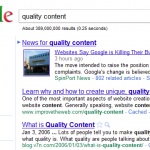 Last week, Google announced its most recent algorithm update. And although the search giant regularly makes small tweaks to the way they present search results, this one affects 35% percent of searches.1
Last week, Google announced its most recent algorithm update. And although the search giant regularly makes small tweaks to the way they present search results, this one affects 35% percent of searches.1
While Google’s previous updates have focused on attacking low-quality sites, this one centers on the timeliness of online content. For topics that frequently change and events that occur regularly, Google is weighing recently posted pages much more heavily for general search queries.
A post on the Official Google Blog explains this further:
If I search for [olympics], I probably want information about next summer’s upcoming Olympics, not the 1900 Summer Olympics … Google Search uses a freshness algorithm, designed to give you the most up-to-date results, so even when I just type [olympics] without specifying 2012, I still find what I’m looking for.
This makes sense for the most part, but it does raise a few concerns. For example, consider Google’s declaration that “even if you don’t specify it in your search, you probably want search results that are … recent.”
They give the example of the keyword [presidential election], and conclude that with this search, users are looking for info about the most recent event, not one 50 years ago. While this makes perfect sense, what about the searcher who is searching for an explanation of the election process, its format, or historical development?
Will these informational results be pushed back to later pages in favor of a mass of “fresh” blog posts all echoing the same pieces of news?
To continue the political examples, I’d envision a similar scenario with a keyword such as [Iowa caucus], where many users will likely be searching for what this process entails, and perhaps how it differs from a primary election, not the latest news from this year’s edition.
It remains to be seen exactly how dominant Google intends to make these “fresh” pieces of content. Right now, Wikipedia pages and other evergreen sites still rank #1 or near the top for most of these keywords, with news updates just below.
But this points to a larger trend of Google guessing user intent, which could prove to be problematic. They do acknowledge that different searches have different freshness needs, but will they able to find the right balance algorithmically? We’ll simply have to wait and see.
1. Google did later clarify that the 35% means searches in which any result is affected, as opposed to searches in which the results are noticeably impacted, which is the language with which they usually report these changes. This latest update only noticeably affects about 6-12% of searches. For comparison, this year’s Panda update noticeably affected about 12%.


Leave a Reply